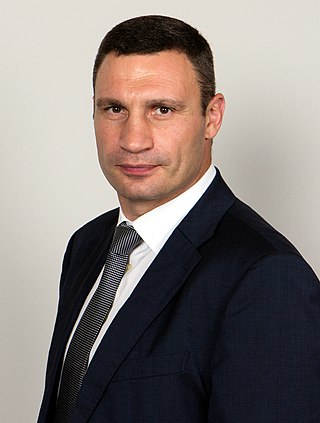
Vitalii Volodymyrovych Klychko, known as Vitali Klitschko, is a Ukrainian politician and former professional boxer. He serves as mayor of Kyiv, and is also head of the Kyiv City State Administration, having held both offices since June 2014. Klitschko is a former leader of the Petro Poroshenko Bloc, and is a former member of the Ukrainian Parliament. He became actively involved in Ukrainian politics in 2005 and combined this with his professional boxing career until his retirement from the sport in 2013. He holds a Doctoral Degree (Ph.D.) from Kyiv University's Physical Science Department.

Oleksandr Oleksandrovych Omelchenko was a Ukrainian politician.
European Solidarity is a political party in Ukraine. It has its roots in a parliamentary group called Solidarity dating from 2000 and has existed since in various forms as a political outlet for Petro Poroshenko. The party with its then name Petro Poroshenko Bloc won 132 of the 423 contested seats in the 2014 Ukrainian parliamentary election, more than any other party.
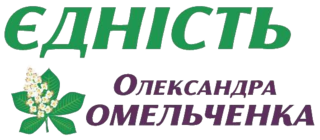
Unity of Oleksandr Omelchenko, prior to 2020 Unity is a political party in Ukraine created in 1999 as a protest party. The party was led by the former mayor of Kyiv Oleksandr Omelchenko although in early 2008, he temporally halted his party membership in favor of a membership of Our Ukraine-Peoples Self Defence. Omelchenko died on November 25, 2021.

The Our Ukraine, formerly known as People's Union "Our Ukraine", is a centre-right political party of Ukraine formed in 2005. The party supported former president Viktor Yushchenko. It has lost much of its support nationwide, yet still has some regional representation in Western Ukraine. Our Ukraine has not participated in national elections since the 2012 Ukrainian parliamentary election.
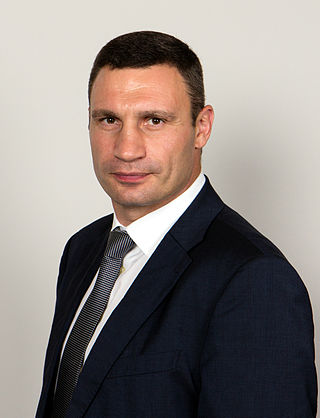
The Head of Kyiv City, unofficially and more commonly the Mayor of Kyiv, is a city official elected by popular vote who serves as a head of the Kyiv city state administration and a chairperson the Kyiv City Council.
Snap mayoral and city council elections were held in Kyiv on 25 May 2008. The election, originally scheduled to be held alongside nationwide 2010 local elections, was called by the Verkhovna Rada by a 246–5 vote on March 18 amid corruption allegations involving the incumbent Mayor Leonid Chernovetskyi. The local election determined the new Mayor of Kyiv, as well as the composition of the 120-seat Kyiv City Council.

The Ukrainian Democratic Alliance for Reform of Vitali Klitschko is a political party in Ukraine headed by retired Ukrainian professional heavyweight boxer and WBC world heavyweight champion emeritus Vitali Klitschko. The party has been an observer member of the European People's Party (EPP) since 2013.

Snap presidential elections were held in Ukraine on 25 May 2014 and resulted in Petro Poroshenko being elected President of Ukraine. Originally scheduled to take place on 29 March 2015, the date was brought forward following the 2014 Ukrainian revolution. Poroshenko won the elections with 55% of the vote, enough to win in a single round. His closest competitor, Yulia Tymoshenko, received 13% of the vote. The Central Election Commission reported voter turnout over 60%, excluding the regions not under government control. Since Poroshenko obtained an absolute majority in the first round, a run-off second ballot was unnecessary.

Volodymyr Dmytrovych Bondarenko was a Ukrainian politician who served as People's Deputy of Ukraine and as member of the citizens' association Choice. Bondarenko was the Head of the Kyiv City Administration from 7 March 2014 until 25 June 2014.

Oleh Valeriiovych Liashko is a Ukrainian politician, journalist and soldier who was a long time member of the Verkhovna Rada and leader of the Radical Party.
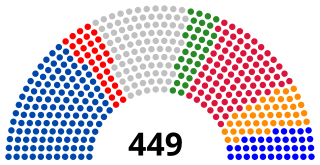
The Verkhovna Rada of Ukraine of the 7th convocation was a convocation of the legislative branch of the Verkhovna Rada, Ukraine's unicameral parliament. Its composition was based on the results of the 2012 parliamentary election. Half of the seats in the parliament were apportioned between the five winning parties based on the popular vote, while the other half was apportioned between 4 parties and 44 independents between 225 constituencies throughout the country. It first met in the capital Kyiv on December 12, 2012, and ended its session on November 27, 2014, after the 8th Verkhovna Rada began its first session.

Lesya Yuriyivna Orobets is a Ukrainian politician and a Member of the Verkhovna Rada of Ukraine since 2007, and was re-elected in 2012.

Snap parliamentary elections were held in Ukraine on 26 October 2014 to elect members of the Verkhovna Rada. President Petro Poroshenko had pressed for early parliamentary elections since his victory in the presidential elections in May. The July breakup of the ruling coalition gave him the right to dissolve the parliament, so on 25 August 2014 he announced the early election.
Democratic Alliance is a pro-European political party in Ukraine, registered in September 2011, formed on a basis of an anti-corruption platform and Young Christian Democrats of Ukraine NGO.
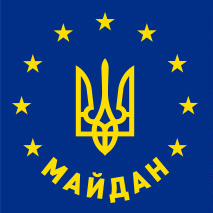
The Maidan People's Union is an alliance in Ukraine formed by several political parties and non-partisan individuals and public organizations on the fifth Sunday of the Euromaidan-protests with the aim of "building a new Ukraine and a new Ukrainian government" by creating a new Ukrainian constitution, and removing corrupt judges and prosecutors. It also aims to organize opposition to the current regime and to coordinate the protest movement in all regions of the country. In practice this means broadening support for the goals of the organization in the pro-government and pro-presidential heartland East Ukraine.

Revival is a political party in Ukraine, established in its current form in June 2015. Its predecessor had been founded by Heorhiy Kirpa in 2004.

The 2014 Ukrainian local elections took place on 25 May 2014, four years after the conclusion of the last local elections, which took place in October 2010. The elections occurred during the political crisis in the aftermath of the 2014 Ukrainian revolution.

New Life is a political party in Ukraine.

The 2020 Ukrainian local elections took place on Sunday 25 October 2020. In the election, deputies of district councils and rural townships were elected and elections for city mayors were held. In practice this will mean that most voters had to fill out four ballots. On 15, 22 and 29 November and 6 December 2020 a second round of mayoral elections was held in cities with more than 75,000 voters where no candidate gained more than 50% of the votes.


















